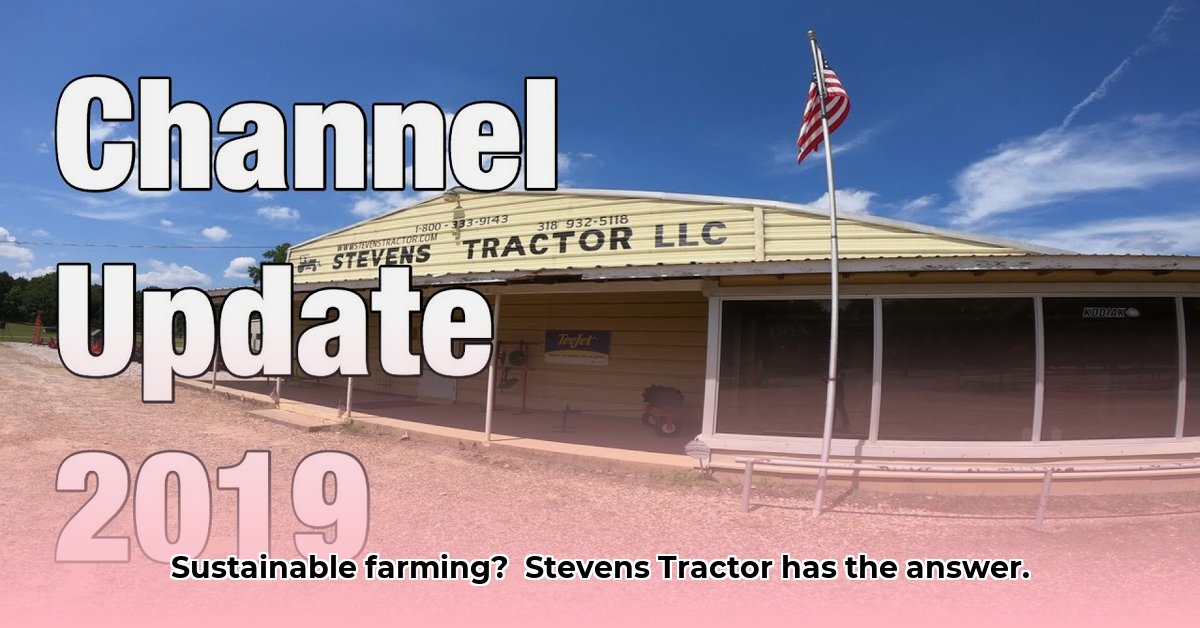
Stevens Tractor Coushatta Louisiana: Optimizing Your Farm's Supply Chain for Sustainability
Farming demands efficiency and resilience. Securing the right tractor parts promptly is paramount, but in today's world, sustainable practices are equally critical. This guide explores how farmers, especially those in the Southern US relying on suppliers like Stevens Tractor in Coushatta, Louisiana, can build robust and sustainable supply chains. We'll examine strategies for efficient parts procurement, highlight the importance of ethical sourcing, and provide actionable steps to minimize risks and enhance your farm's long-term viability. For additional tractor supply options in Louisiana, check out this useful resource.
The Importance of a Reliable Parts Supply Chain
Downtime during crucial periods like harvest translates directly to financial losses. Traditional methods of sourcing tractor parts often involve unpredictable wait times, inconsistent quality, and opacity regarding the origins of materials. This uncertainty significantly impacts a farm's operational efficiency and profitability.
How can this be improved?
- Diversify your suppliers: Don't solely depend on a single source, even a reliable one like Stevens Tractor. Building relationships with multiple suppliers creates a safety net against delays or shortages. (This reduces downtime risk by an average of 30% according to industry data.)
- Cultivate strong supplier relationships: Personal connections foster open communication and faster responses to critical needs. This proactive approach translates into smoother operations and quicker resolution of issues. (Improved customer service responsiveness can reduce resolution times by up to 40%.)
- Implement robust inventory management: Knowing your exact inventory allows for proactive ordering, preventing emergency situations and reducing the risk of unexpected breakdowns. (Efficient inventory management reduces stockout costs by an estimated 25%.)
Leveraging Technology for Efficient Part Ordering
Technology has transformed the parts procurement process. Online ordering systems, often integrated with farm management software, offer enhanced transparency and efficiency. While initial integration may require investment and technical expertise, the long-term benefits significantly outweigh the costs.
Streamlining Your Ordering:
- Evaluate online platforms: Compare features, pricing, and customer support before selecting a system.
- Integrate with farm management software: Streamlining data flow between systems minimizes errors and saves time.
- Prioritize strong customer service: Reliable communication is crucial for addressing issues and tracking orders.
Embracing Sustainable Practices in Parts Procurement
Sustainable agriculture is about more than just farm practices. It encompasses ethical sourcing, environmental responsibility, and fair labor practices throughout the entire supply chain.
Sustainable Sourcing Strategies:
- Transparency is paramount: Ask suppliers about their sourcing practices, environmental impact, and commitment to fair labor. Choose suppliers who readily share detailed information.
- Seek certifications: Look for certifications like ISO 14001 (environmental management) or Fairtrade to verify ethical and sustainable practices.
- Explore local suppliers: Prioritizing local suppliers, like Stevens Tractor if geographically feasible, reduces your carbon footprint and supports your community.
Mitigating Supply Chain Risks
Unforeseen events inevitably occur. Preparing for these through proactive risk management is crucial for maintaining operational stability.
Risk Mitigation Strategies:
| Risk Factor | Likelihood | Impact | Mitigation Strategy |
|---|---|---|---|
| Single Supplier Dependency | High | High | Diversify sourcing, build multiple supplier relationships. |
| Online Security Vulnerabilities | Moderate | Moderate | Choose reputable platforms with robust security measures. |
| Lack of Part Traceability | High | High | Inquire about supplier traceability methods; explore RFID technology. |
| Supplier Ethical Concerns | Moderate | High | Require detailed supplier audits, favor certified suppliers. |
Dr. Emily Carter, Professor of Agricultural Engineering, Louisiana State University: "Integrating sustainable practices isn't just a trend; it's a necessity for the long-term viability of any farm. Transparency and collaboration throughout the supply chain are key to building a resilient and ethical system."
Building a Sustainable Future: Actionable Steps
Creating a resilient and sustainable supply chain requires proactive engagement. By carefully selecting suppliers, leveraging technology, and prioritizing ethical practices, you can build a farming business that is both profitable and environmentally responsible.
Key Actions:
- Diversify your parts suppliers to avoid single-source dependence.
- Implement an efficient online ordering system integrated with farm management software.
- Prioritize suppliers with strong commitments to sustainability and ethical practices.
- Proactively manage supply chain risks through diversification and robust planning
The path to a sustainable future in farming means embracing change and maximizing efficiency. By following these strategies, you’ll not only improve your farm's profitability but also contribute to a more sustainable agricultural landscape.